Entrepreneurship: Venture Types, Economic Impact, and Traits
VerifiedAdded on 2021/01/01
|15
|4421
|107
Report
AI Summary
This report provides an analysis of entrepreneurship and small business management, focusing on different types of entrepreneurial ventures and their relationship to the typology of entrepreneurship. It examines the similarities and differences between private, public, and voluntary ventures, and uses relevant data and statistics to determine the impact of micro and small businesses on the economy. The report also highlights the importance of small businesses and start-ups in the growth of the social economy, and evaluates the skills, traits, and characteristics of successful entrepreneurs. Furthermore, it explores how aspects of the entrepreneurial personality reflect entrepreneurial motivation and mindset, and how a person’s background and past experiences can either hinder or foster entrepreneurship. The report concludes by summarizing the key findings and providing references for further research.

Entrepreneurship and small
business management
business management
Paraphrase This Document
Need a fresh take? Get an instant paraphrase of this document with our AI Paraphraser
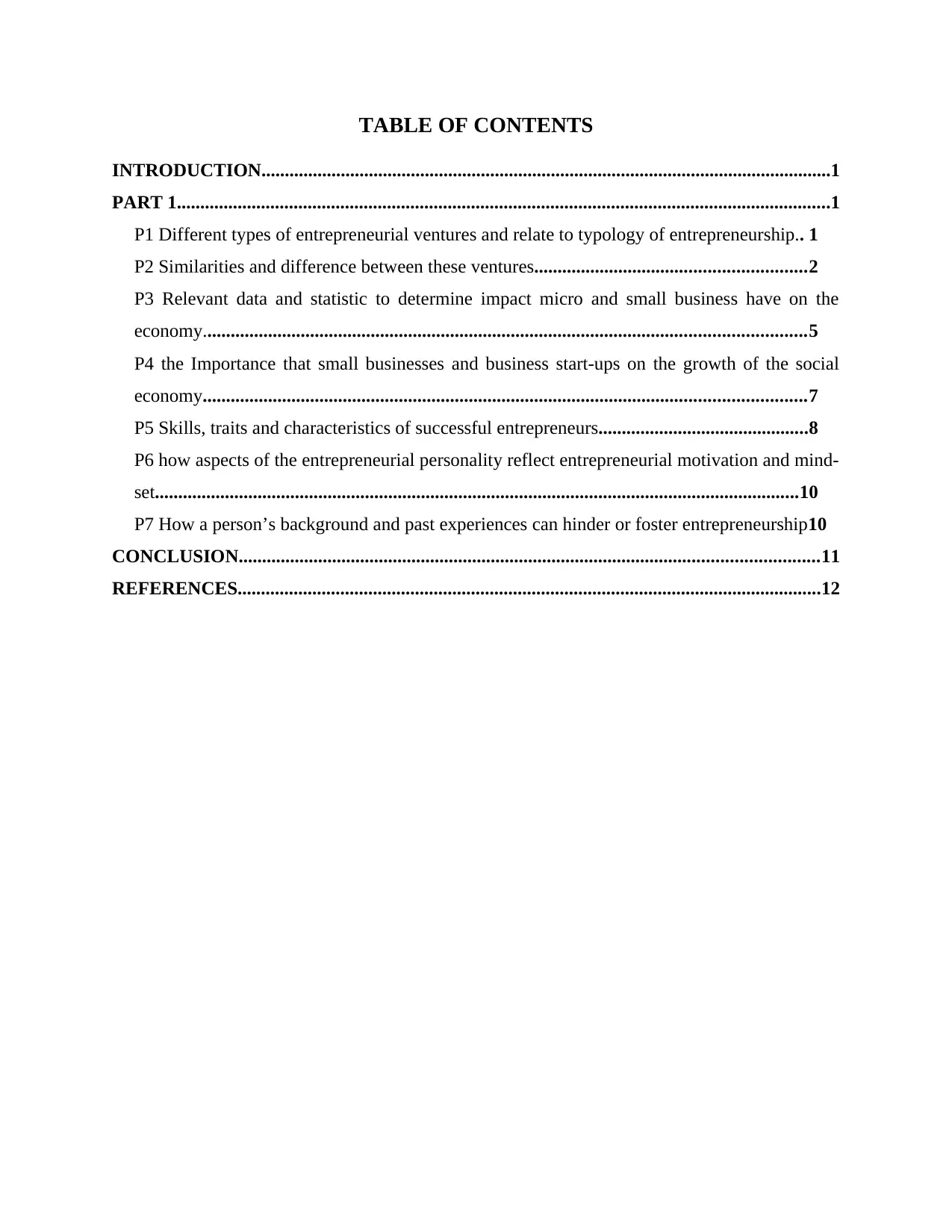
TABLE OF CONTENTS
INTRODUCTION..........................................................................................................................1
PART 1............................................................................................................................................1
P1 Different types of entrepreneurial ventures and relate to typology of entrepreneurship.. 1
P2 Similarities and difference between these ventures..........................................................2
P3 Relevant data and statistic to determine impact micro and small business have on the
economy.................................................................................................................................5
P4 the Importance that small businesses and business start-ups on the growth of the social
economy.................................................................................................................................7
P5 Skills, traits and characteristics of successful entrepreneurs.............................................8
P6 how aspects of the entrepreneurial personality reflect entrepreneurial motivation and mind-
set..........................................................................................................................................10
P7 How a person’s background and past experiences can hinder or foster entrepreneurship10
CONCLUSION............................................................................................................................11
REFERENCES.............................................................................................................................12
INTRODUCTION..........................................................................................................................1
PART 1............................................................................................................................................1
P1 Different types of entrepreneurial ventures and relate to typology of entrepreneurship.. 1
P2 Similarities and difference between these ventures..........................................................2
P3 Relevant data and statistic to determine impact micro and small business have on the
economy.................................................................................................................................5
P4 the Importance that small businesses and business start-ups on the growth of the social
economy.................................................................................................................................7
P5 Skills, traits and characteristics of successful entrepreneurs.............................................8
P6 how aspects of the entrepreneurial personality reflect entrepreneurial motivation and mind-
set..........................................................................................................................................10
P7 How a person’s background and past experiences can hinder or foster entrepreneurship10
CONCLUSION............................................................................................................................11
REFERENCES.............................................................................................................................12
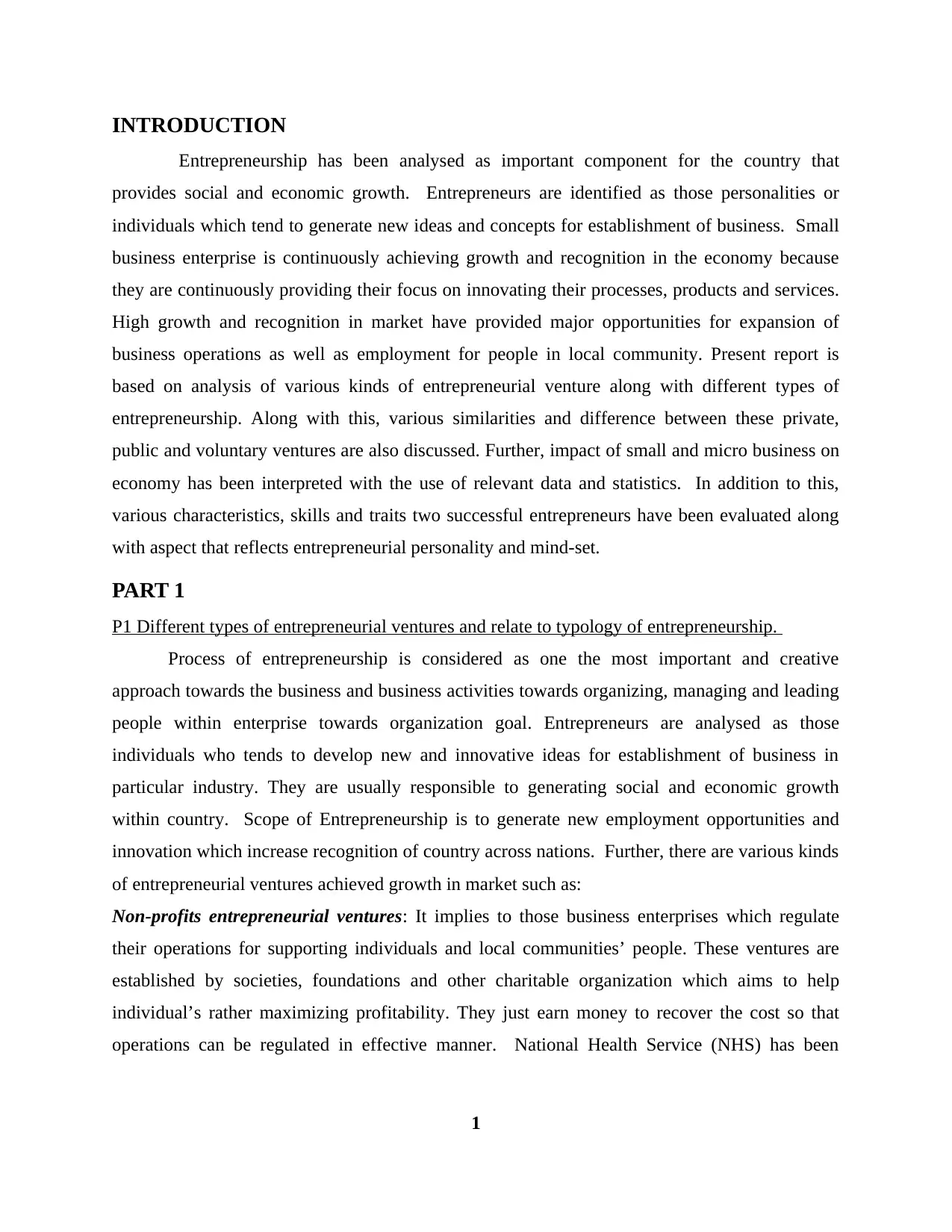
INTRODUCTION
Entrepreneurship has been analysed as important component for the country that
provides social and economic growth. Entrepreneurs are identified as those personalities or
individuals which tend to generate new ideas and concepts for establishment of business. Small
business enterprise is continuously achieving growth and recognition in the economy because
they are continuously providing their focus on innovating their processes, products and services.
High growth and recognition in market have provided major opportunities for expansion of
business operations as well as employment for people in local community. Present report is
based on analysis of various kinds of entrepreneurial venture along with different types of
entrepreneurship. Along with this, various similarities and difference between these private,
public and voluntary ventures are also discussed. Further, impact of small and micro business on
economy has been interpreted with the use of relevant data and statistics. In addition to this,
various characteristics, skills and traits two successful entrepreneurs have been evaluated along
with aspect that reflects entrepreneurial personality and mind-set.
PART 1
P1 Different types of entrepreneurial ventures and relate to typology of entrepreneurship.
Process of entrepreneurship is considered as one the most important and creative
approach towards the business and business activities towards organizing, managing and leading
people within enterprise towards organization goal. Entrepreneurs are analysed as those
individuals who tends to develop new and innovative ideas for establishment of business in
particular industry. They are usually responsible to generating social and economic growth
within country. Scope of Entrepreneurship is to generate new employment opportunities and
innovation which increase recognition of country across nations. Further, there are various kinds
of entrepreneurial ventures achieved growth in market such as:
Non-profits entrepreneurial ventures: It implies to those business enterprises which regulate
their operations for supporting individuals and local communities’ people. These ventures are
established by societies, foundations and other charitable organization which aims to help
individual’s rather maximizing profitability. They just earn money to recover the cost so that
operations can be regulated in effective manner. National Health Service (NHS) has been
1
Entrepreneurship has been analysed as important component for the country that
provides social and economic growth. Entrepreneurs are identified as those personalities or
individuals which tend to generate new ideas and concepts for establishment of business. Small
business enterprise is continuously achieving growth and recognition in the economy because
they are continuously providing their focus on innovating their processes, products and services.
High growth and recognition in market have provided major opportunities for expansion of
business operations as well as employment for people in local community. Present report is
based on analysis of various kinds of entrepreneurial venture along with different types of
entrepreneurship. Along with this, various similarities and difference between these private,
public and voluntary ventures are also discussed. Further, impact of small and micro business on
economy has been interpreted with the use of relevant data and statistics. In addition to this,
various characteristics, skills and traits two successful entrepreneurs have been evaluated along
with aspect that reflects entrepreneurial personality and mind-set.
PART 1
P1 Different types of entrepreneurial ventures and relate to typology of entrepreneurship.
Process of entrepreneurship is considered as one the most important and creative
approach towards the business and business activities towards organizing, managing and leading
people within enterprise towards organization goal. Entrepreneurs are analysed as those
individuals who tends to develop new and innovative ideas for establishment of business in
particular industry. They are usually responsible to generating social and economic growth
within country. Scope of Entrepreneurship is to generate new employment opportunities and
innovation which increase recognition of country across nations. Further, there are various kinds
of entrepreneurial ventures achieved growth in market such as:
Non-profits entrepreneurial ventures: It implies to those business enterprises which regulate
their operations for supporting individuals and local communities’ people. These ventures are
established by societies, foundations and other charitable organization which aims to help
individual’s rather maximizing profitability. They just earn money to recover the cost so that
operations can be regulated in effective manner. National Health Service (NHS) has been
1
⊘ This is a preview!⊘
Do you want full access?
Subscribe today to unlock all pages.

Trusted by 1+ million students worldwide
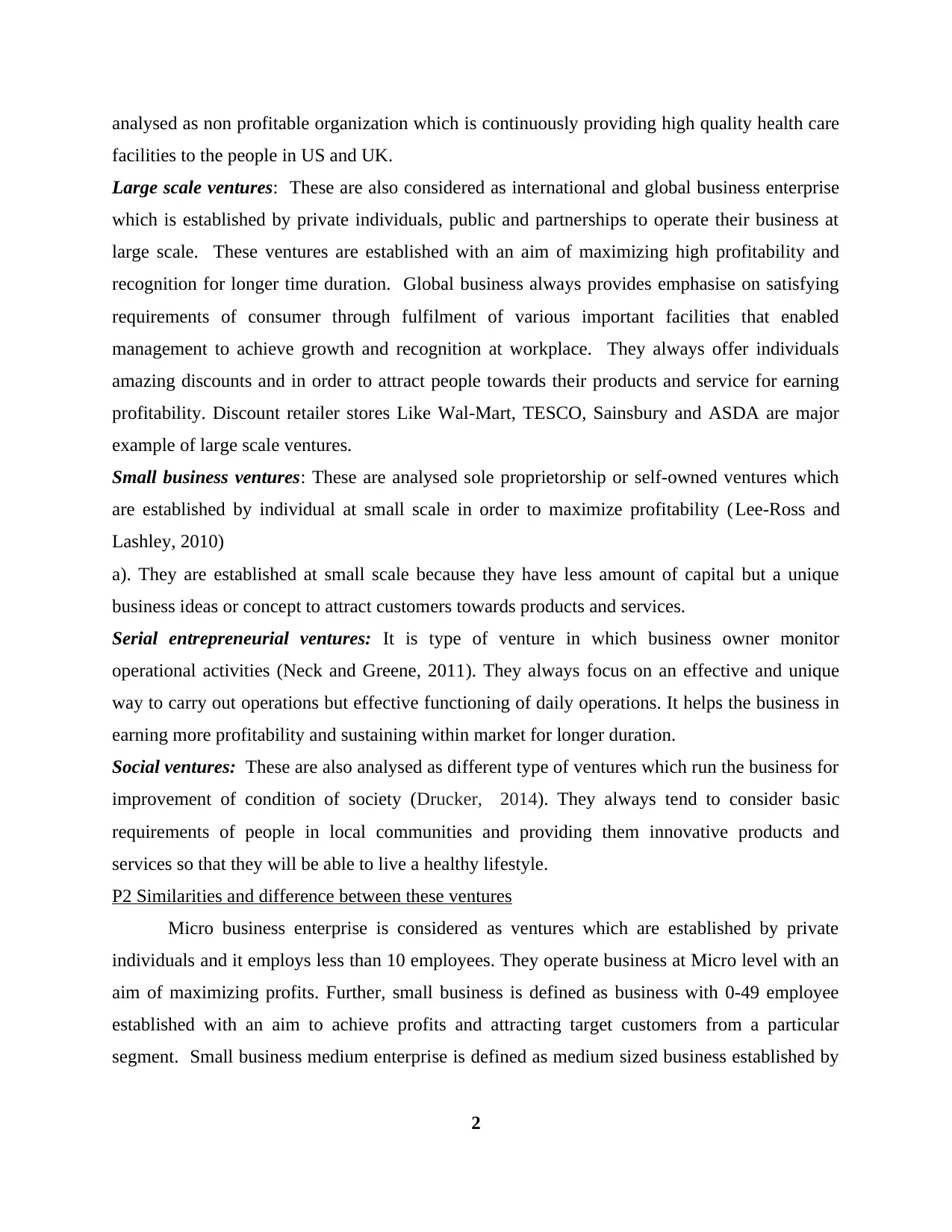
analysed as non profitable organization which is continuously providing high quality health care
facilities to the people in US and UK.
Large scale ventures: These are also considered as international and global business enterprise
which is established by private individuals, public and partnerships to operate their business at
large scale. These ventures are established with an aim of maximizing high profitability and
recognition for longer time duration. Global business always provides emphasise on satisfying
requirements of consumer through fulfilment of various important facilities that enabled
management to achieve growth and recognition at workplace. They always offer individuals
amazing discounts and in order to attract people towards their products and service for earning
profitability. Discount retailer stores Like Wal-Mart, TESCO, Sainsbury and ASDA are major
example of large scale ventures.
Small business ventures: These are analysed sole proprietorship or self-owned ventures which
are established by individual at small scale in order to maximize profitability (Lee-Ross and
Lashley, 2010)
a). They are established at small scale because they have less amount of capital but a unique
business ideas or concept to attract customers towards products and services.
Serial entrepreneurial ventures: It is type of venture in which business owner monitor
operational activities (Neck and Greene, 2011). They always focus on an effective and unique
way to carry out operations but effective functioning of daily operations. It helps the business in
earning more profitability and sustaining within market for longer duration.
Social ventures: These are also analysed as different type of ventures which run the business for
improvement of condition of society (Drucker, 2014). They always tend to consider basic
requirements of people in local communities and providing them innovative products and
services so that they will be able to live a healthy lifestyle.
P2 Similarities and difference between these ventures
Micro business enterprise is considered as ventures which are established by private
individuals and it employs less than 10 employees. They operate business at Micro level with an
aim of maximizing profits. Further, small business is defined as business with 0-49 employee
established with an aim to achieve profits and attracting target customers from a particular
segment. Small business medium enterprise is defined as medium sized business established by
2
facilities to the people in US and UK.
Large scale ventures: These are also considered as international and global business enterprise
which is established by private individuals, public and partnerships to operate their business at
large scale. These ventures are established with an aim of maximizing high profitability and
recognition for longer time duration. Global business always provides emphasise on satisfying
requirements of consumer through fulfilment of various important facilities that enabled
management to achieve growth and recognition at workplace. They always offer individuals
amazing discounts and in order to attract people towards their products and service for earning
profitability. Discount retailer stores Like Wal-Mart, TESCO, Sainsbury and ASDA are major
example of large scale ventures.
Small business ventures: These are analysed sole proprietorship or self-owned ventures which
are established by individual at small scale in order to maximize profitability (Lee-Ross and
Lashley, 2010)
a). They are established at small scale because they have less amount of capital but a unique
business ideas or concept to attract customers towards products and services.
Serial entrepreneurial ventures: It is type of venture in which business owner monitor
operational activities (Neck and Greene, 2011). They always focus on an effective and unique
way to carry out operations but effective functioning of daily operations. It helps the business in
earning more profitability and sustaining within market for longer duration.
Social ventures: These are also analysed as different type of ventures which run the business for
improvement of condition of society (Drucker, 2014). They always tend to consider basic
requirements of people in local communities and providing them innovative products and
services so that they will be able to live a healthy lifestyle.
P2 Similarities and difference between these ventures
Micro business enterprise is considered as ventures which are established by private
individuals and it employs less than 10 employees. They operate business at Micro level with an
aim of maximizing profits. Further, small business is defined as business with 0-49 employee
established with an aim to achieve profits and attracting target customers from a particular
segment. Small business medium enterprise is defined as medium sized business established by
2
Paraphrase This Document
Need a fresh take? Get an instant paraphrase of this document with our AI Paraphraser
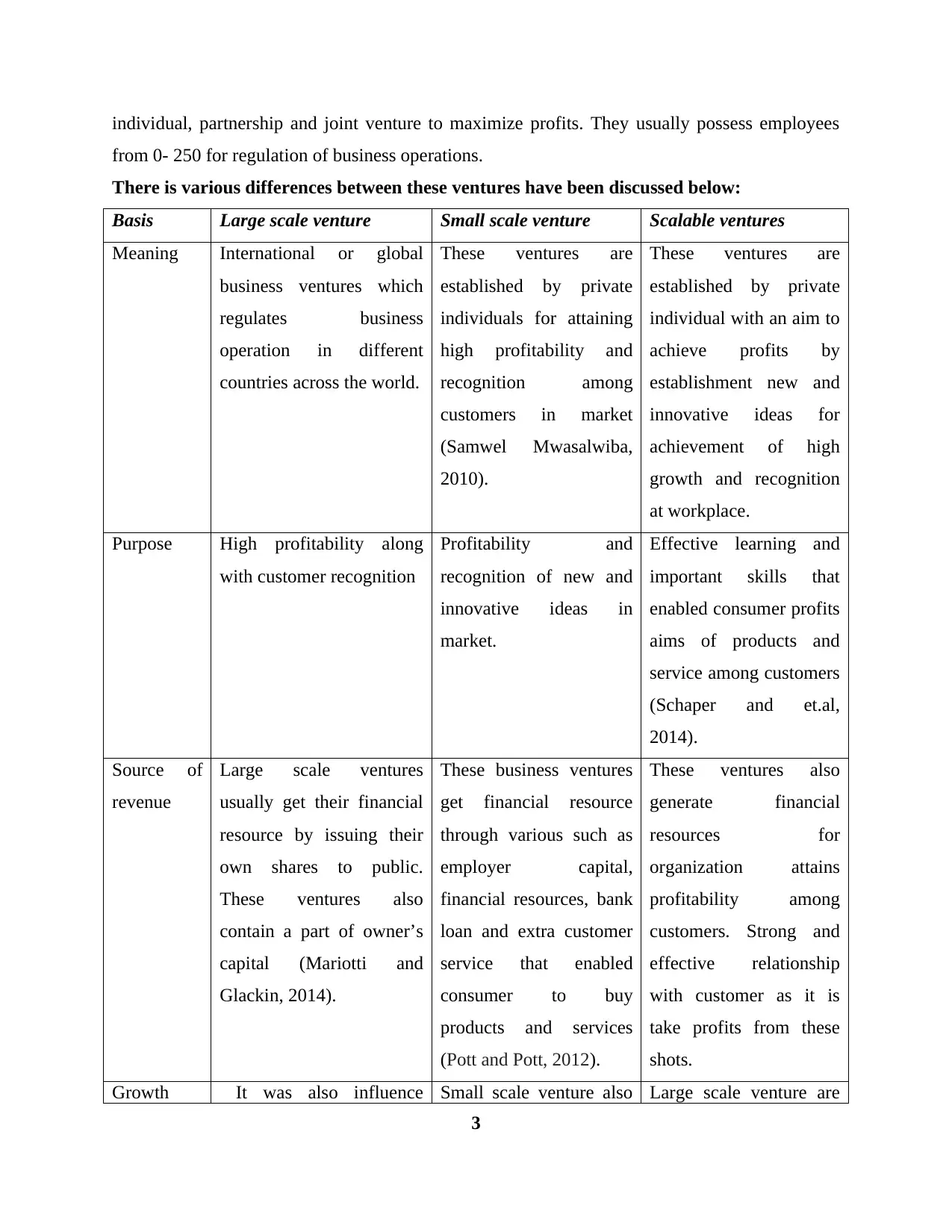
individual, partnership and joint venture to maximize profits. They usually possess employees
from 0- 250 for regulation of business operations.
There is various differences between these ventures have been discussed below:
Basis Large scale venture Small scale venture Scalable ventures
Meaning International or global
business ventures which
regulates business
operation in different
countries across the world.
These ventures are
established by private
individuals for attaining
high profitability and
recognition among
customers in market
(Samwel Mwasalwiba,
2010).
These ventures are
established by private
individual with an aim to
achieve profits by
establishment new and
innovative ideas for
achievement of high
growth and recognition
at workplace.
Purpose High profitability along
with customer recognition
Profitability and
recognition of new and
innovative ideas in
market.
Effective learning and
important skills that
enabled consumer profits
aims of products and
service among customers
(Schaper and et.al,
2014).
Source of
revenue
Large scale ventures
usually get their financial
resource by issuing their
own shares to public.
These ventures also
contain a part of owner’s
capital (Mariotti and
Glackin, 2014).
These business ventures
get financial resource
through various such as
employer capital,
financial resources, bank
loan and extra customer
service that enabled
consumer to buy
products and services
(Pott and Pott, 2012).
These ventures also
generate financial
resources for
organization attains
profitability among
customers. Strong and
effective relationship
with customer as it is
take profits from these
shots.
Growth It was also influence Small scale venture also Large scale venture are
3
from 0- 250 for regulation of business operations.
There is various differences between these ventures have been discussed below:
Basis Large scale venture Small scale venture Scalable ventures
Meaning International or global
business ventures which
regulates business
operation in different
countries across the world.
These ventures are
established by private
individuals for attaining
high profitability and
recognition among
customers in market
(Samwel Mwasalwiba,
2010).
These ventures are
established by private
individual with an aim to
achieve profits by
establishment new and
innovative ideas for
achievement of high
growth and recognition
at workplace.
Purpose High profitability along
with customer recognition
Profitability and
recognition of new and
innovative ideas in
market.
Effective learning and
important skills that
enabled consumer profits
aims of products and
service among customers
(Schaper and et.al,
2014).
Source of
revenue
Large scale ventures
usually get their financial
resource by issuing their
own shares to public.
These ventures also
contain a part of owner’s
capital (Mariotti and
Glackin, 2014).
These business ventures
get financial resource
through various such as
employer capital,
financial resources, bank
loan and extra customer
service that enabled
consumer to buy
products and services
(Pott and Pott, 2012).
These ventures also
generate financial
resources for
organization attains
profitability among
customers. Strong and
effective relationship
with customer as it is
take profits from these
shots.
Growth It was also influence Small scale venture also Large scale venture are
3
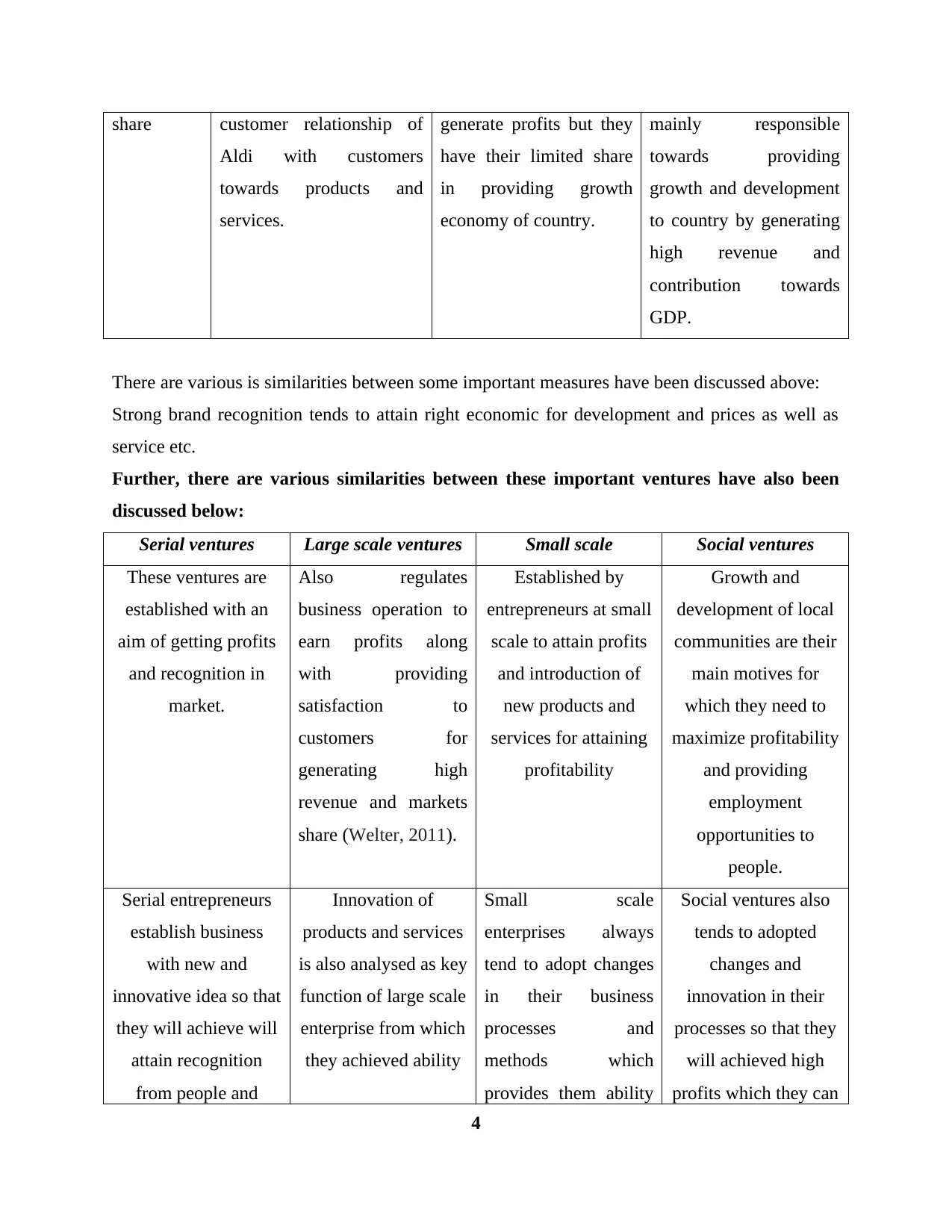
share customer relationship of
Aldi with customers
towards products and
services.
generate profits but they
have their limited share
in providing growth
economy of country.
mainly responsible
towards providing
growth and development
to country by generating
high revenue and
contribution towards
GDP.
There are various is similarities between some important measures have been discussed above:
Strong brand recognition tends to attain right economic for development and prices as well as
service etc.
Further, there are various similarities between these important ventures have also been
discussed below:
Serial ventures Large scale ventures Small scale Social ventures
These ventures are
established with an
aim of getting profits
and recognition in
market.
Also regulates
business operation to
earn profits along
with providing
satisfaction to
customers for
generating high
revenue and markets
share (Welter, 2011).
Established by
entrepreneurs at small
scale to attain profits
and introduction of
new products and
services for attaining
profitability
Growth and
development of local
communities are their
main motives for
which they need to
maximize profitability
and providing
employment
opportunities to
people.
Serial entrepreneurs
establish business
with new and
innovative idea so that
they will achieve will
attain recognition
from people and
Innovation of
products and services
is also analysed as key
function of large scale
enterprise from which
they achieved ability
Small scale
enterprises always
tend to adopt changes
in their business
processes and
methods which
provides them ability
Social ventures also
tends to adopted
changes and
innovation in their
processes so that they
will achieved high
profits which they can
4
Aldi with customers
towards products and
services.
generate profits but they
have their limited share
in providing growth
economy of country.
mainly responsible
towards providing
growth and development
to country by generating
high revenue and
contribution towards
GDP.
There are various is similarities between some important measures have been discussed above:
Strong brand recognition tends to attain right economic for development and prices as well as
service etc.
Further, there are various similarities between these important ventures have also been
discussed below:
Serial ventures Large scale ventures Small scale Social ventures
These ventures are
established with an
aim of getting profits
and recognition in
market.
Also regulates
business operation to
earn profits along
with providing
satisfaction to
customers for
generating high
revenue and markets
share (Welter, 2011).
Established by
entrepreneurs at small
scale to attain profits
and introduction of
new products and
services for attaining
profitability
Growth and
development of local
communities are their
main motives for
which they need to
maximize profitability
and providing
employment
opportunities to
people.
Serial entrepreneurs
establish business
with new and
innovative idea so that
they will achieve will
attain recognition
from people and
Innovation of
products and services
is also analysed as key
function of large scale
enterprise from which
they achieved ability
Small scale
enterprises always
tend to adopt changes
in their business
processes and
methods which
provides them ability
Social ventures also
tends to adopted
changes and
innovation in their
processes so that they
will achieved high
profits which they can
4
⊘ This is a preview!⊘
Do you want full access?
Subscribe today to unlock all pages.

Trusted by 1+ million students worldwide
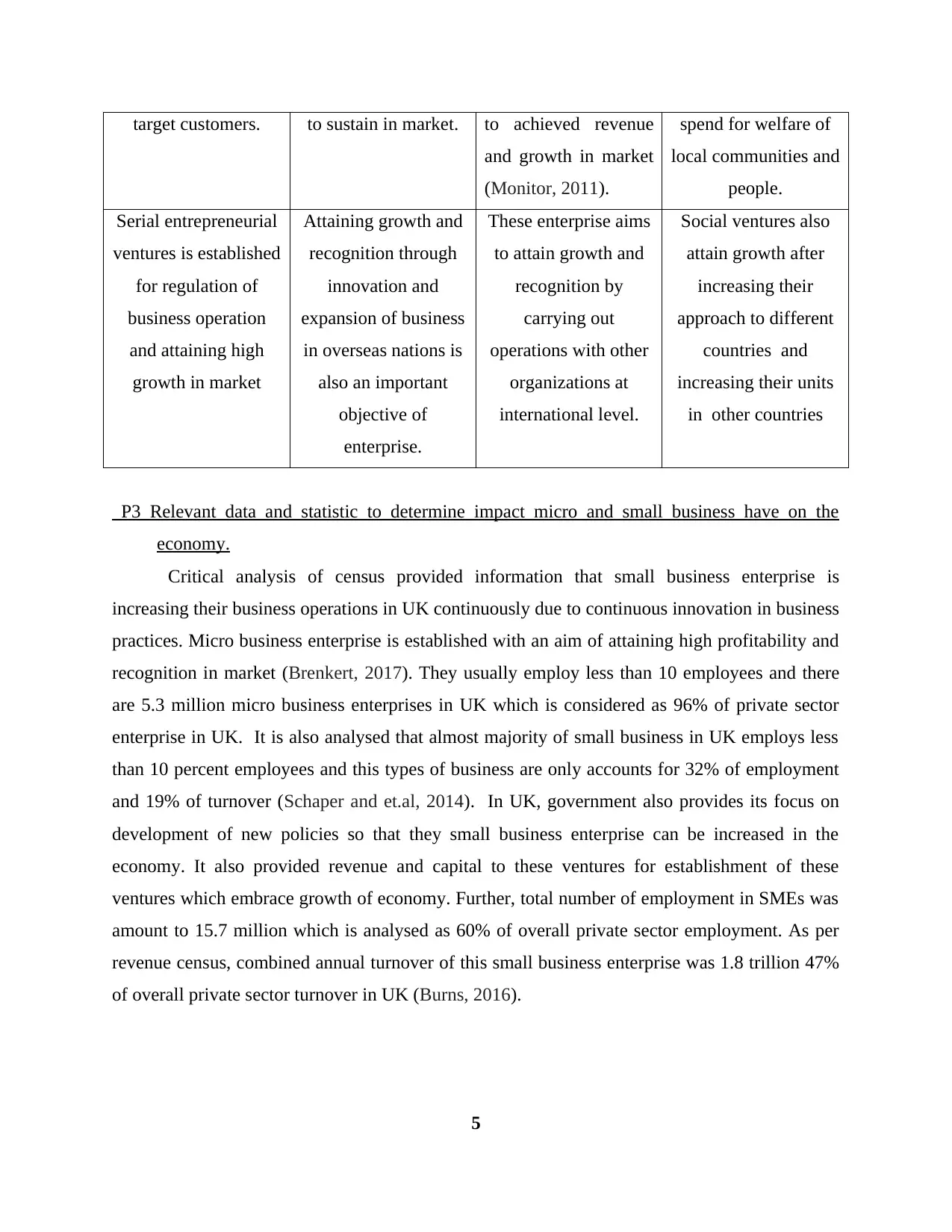
target customers. to sustain in market. to achieved revenue
and growth in market
(Monitor, 2011).
spend for welfare of
local communities and
people.
Serial entrepreneurial
ventures is established
for regulation of
business operation
and attaining high
growth in market
Attaining growth and
recognition through
innovation and
expansion of business
in overseas nations is
also an important
objective of
enterprise.
These enterprise aims
to attain growth and
recognition by
carrying out
operations with other
organizations at
international level.
Social ventures also
attain growth after
increasing their
approach to different
countries and
increasing their units
in other countries
P3 Relevant data and statistic to determine impact micro and small business have on the
economy.
Critical analysis of census provided information that small business enterprise is
increasing their business operations in UK continuously due to continuous innovation in business
practices. Micro business enterprise is established with an aim of attaining high profitability and
recognition in market (Brenkert, 2017). They usually employ less than 10 employees and there
are 5.3 million micro business enterprises in UK which is considered as 96% of private sector
enterprise in UK. It is also analysed that almost majority of small business in UK employs less
than 10 percent employees and this types of business are only accounts for 32% of employment
and 19% of turnover (Schaper and et.al, 2014). In UK, government also provides its focus on
development of new policies so that they small business enterprise can be increased in the
economy. It also provided revenue and capital to these ventures for establishment of these
ventures which embrace growth of economy. Further, total number of employment in SMEs was
amount to 15.7 million which is analysed as 60% of overall private sector employment. As per
revenue census, combined annual turnover of this small business enterprise was 1.8 trillion 47%
of overall private sector turnover in UK (Burns, 2016).
5
and growth in market
(Monitor, 2011).
spend for welfare of
local communities and
people.
Serial entrepreneurial
ventures is established
for regulation of
business operation
and attaining high
growth in market
Attaining growth and
recognition through
innovation and
expansion of business
in overseas nations is
also an important
objective of
enterprise.
These enterprise aims
to attain growth and
recognition by
carrying out
operations with other
organizations at
international level.
Social ventures also
attain growth after
increasing their
approach to different
countries and
increasing their units
in other countries
P3 Relevant data and statistic to determine impact micro and small business have on the
economy.
Critical analysis of census provided information that small business enterprise is
increasing their business operations in UK continuously due to continuous innovation in business
practices. Micro business enterprise is established with an aim of attaining high profitability and
recognition in market (Brenkert, 2017). They usually employ less than 10 employees and there
are 5.3 million micro business enterprises in UK which is considered as 96% of private sector
enterprise in UK. It is also analysed that almost majority of small business in UK employs less
than 10 percent employees and this types of business are only accounts for 32% of employment
and 19% of turnover (Schaper and et.al, 2014). In UK, government also provides its focus on
development of new policies so that they small business enterprise can be increased in the
economy. It also provided revenue and capital to these ventures for establishment of these
ventures which embrace growth of economy. Further, total number of employment in SMEs was
amount to 15.7 million which is analysed as 60% of overall private sector employment. As per
revenue census, combined annual turnover of this small business enterprise was 1.8 trillion 47%
of overall private sector turnover in UK (Burns, 2016).
5
Paraphrase This Document
Need a fresh take? Get an instant paraphrase of this document with our AI Paraphraser
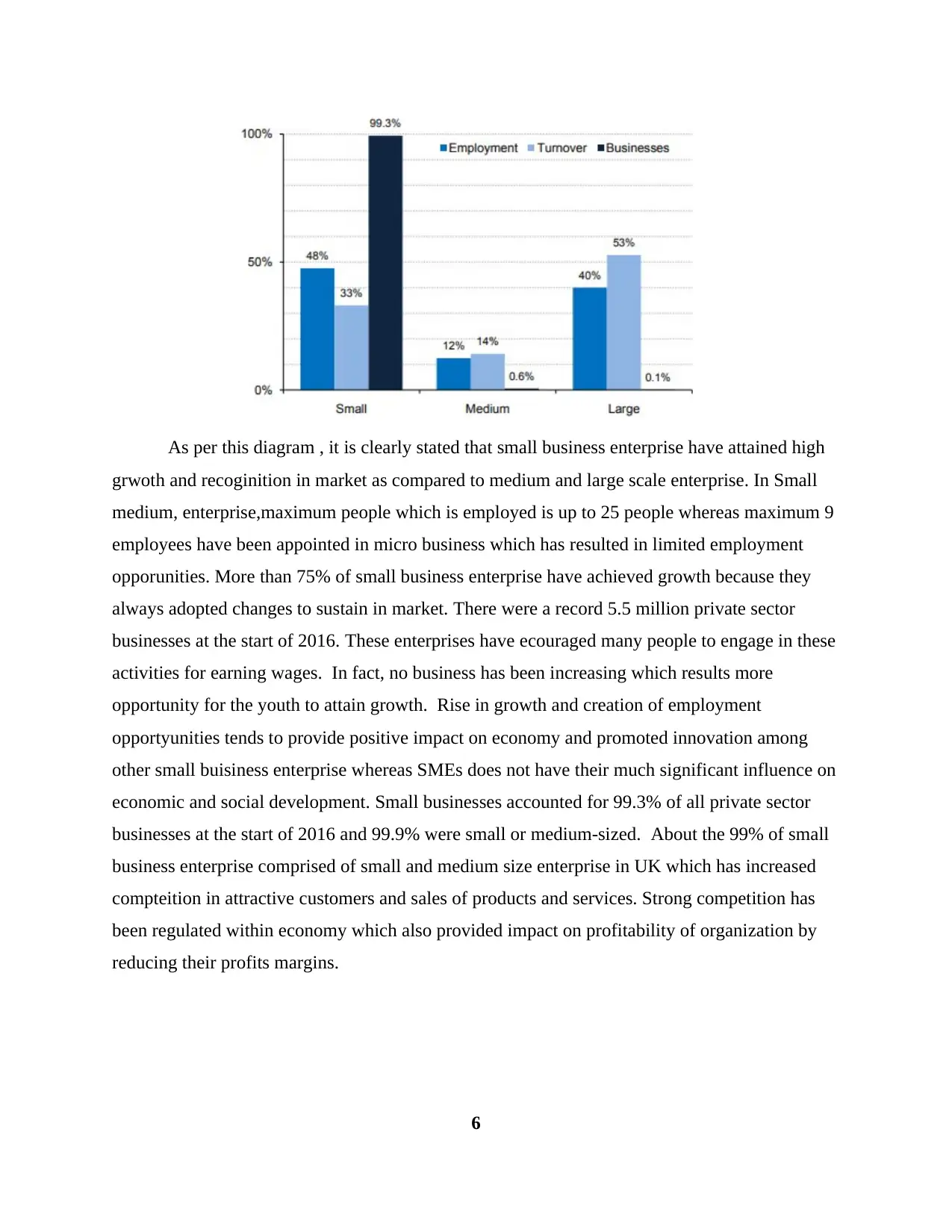
As per this diagram , it is clearly stated that small business enterprise have attained high
grwoth and recoginition in market as compared to medium and large scale enterprise. In Small
medium, enterprise,maximum people which is employed is up to 25 people whereas maximum 9
employees have been appointed in micro business which has resulted in limited employment
opporunities. More than 75% of small business enterprise have achieved growth because they
always adopted changes to sustain in market. There were a record 5.5 million private sector
businesses at the start of 2016. These enterprises have ecouraged many people to engage in these
activities for earning wages. In fact, no business has been increasing which results more
opportunity for the youth to attain growth. Rise in growth and creation of employment
opportyunities tends to provide positive impact on economy and promoted innovation among
other small buisiness enterprise whereas SMEs does not have their much significant influence on
economic and social development. Small businesses accounted for 99.3% of all private sector
businesses at the start of 2016 and 99.9% were small or medium-sized. About the 99% of small
business enterprise comprised of small and medium size enterprise in UK which has increased
compteition in attractive customers and sales of products and services. Strong competition has
been regulated within economy which also provided impact on profitability of organization by
reducing their profits margins.
6
grwoth and recoginition in market as compared to medium and large scale enterprise. In Small
medium, enterprise,maximum people which is employed is up to 25 people whereas maximum 9
employees have been appointed in micro business which has resulted in limited employment
opporunities. More than 75% of small business enterprise have achieved growth because they
always adopted changes to sustain in market. There were a record 5.5 million private sector
businesses at the start of 2016. These enterprises have ecouraged many people to engage in these
activities for earning wages. In fact, no business has been increasing which results more
opportunity for the youth to attain growth. Rise in growth and creation of employment
opportyunities tends to provide positive impact on economy and promoted innovation among
other small buisiness enterprise whereas SMEs does not have their much significant influence on
economic and social development. Small businesses accounted for 99.3% of all private sector
businesses at the start of 2016 and 99.9% were small or medium-sized. About the 99% of small
business enterprise comprised of small and medium size enterprise in UK which has increased
compteition in attractive customers and sales of products and services. Strong competition has
been regulated within economy which also provided impact on profitability of organization by
reducing their profits margins.
6
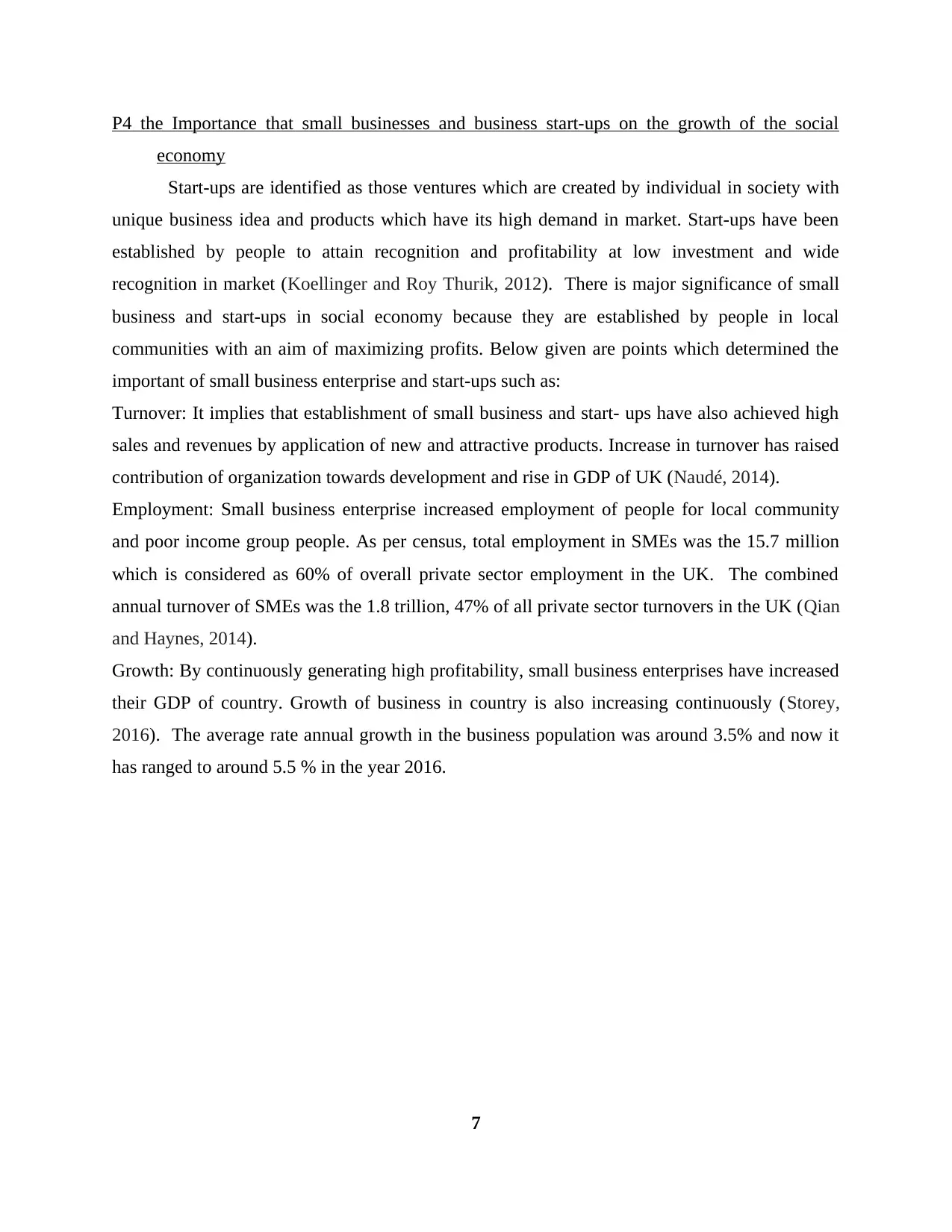
P4 the Importance that small businesses and business start-ups on the growth of the social
economy
Start-ups are identified as those ventures which are created by individual in society with
unique business idea and products which have its high demand in market. Start-ups have been
established by people to attain recognition and profitability at low investment and wide
recognition in market (Koellinger and Roy Thurik, 2012). There is major significance of small
business and start-ups in social economy because they are established by people in local
communities with an aim of maximizing profits. Below given are points which determined the
important of small business enterprise and start-ups such as:
Turnover: It implies that establishment of small business and start- ups have also achieved high
sales and revenues by application of new and attractive products. Increase in turnover has raised
contribution of organization towards development and rise in GDP of UK (Naudé, 2014).
Employment: Small business enterprise increased employment of people for local community
and poor income group people. As per census, total employment in SMEs was the 15.7 million
which is considered as 60% of overall private sector employment in the UK. The combined
annual turnover of SMEs was the 1.8 trillion, 47% of all private sector turnovers in the UK (Qian
and Haynes, 2014).
Growth: By continuously generating high profitability, small business enterprises have increased
their GDP of country. Growth of business in country is also increasing continuously (Storey,
2016). The average rate annual growth in the business population was around 3.5% and now it
has ranged to around 5.5 % in the year 2016.
7
economy
Start-ups are identified as those ventures which are created by individual in society with
unique business idea and products which have its high demand in market. Start-ups have been
established by people to attain recognition and profitability at low investment and wide
recognition in market (Koellinger and Roy Thurik, 2012). There is major significance of small
business and start-ups in social economy because they are established by people in local
communities with an aim of maximizing profits. Below given are points which determined the
important of small business enterprise and start-ups such as:
Turnover: It implies that establishment of small business and start- ups have also achieved high
sales and revenues by application of new and attractive products. Increase in turnover has raised
contribution of organization towards development and rise in GDP of UK (Naudé, 2014).
Employment: Small business enterprise increased employment of people for local community
and poor income group people. As per census, total employment in SMEs was the 15.7 million
which is considered as 60% of overall private sector employment in the UK. The combined
annual turnover of SMEs was the 1.8 trillion, 47% of all private sector turnovers in the UK (Qian
and Haynes, 2014).
Growth: By continuously generating high profitability, small business enterprises have increased
their GDP of country. Growth of business in country is also increasing continuously (Storey,
2016). The average rate annual growth in the business population was around 3.5% and now it
has ranged to around 5.5 % in the year 2016.
7
⊘ This is a preview!⊘
Do you want full access?
Subscribe today to unlock all pages.

Trusted by 1+ million students worldwide
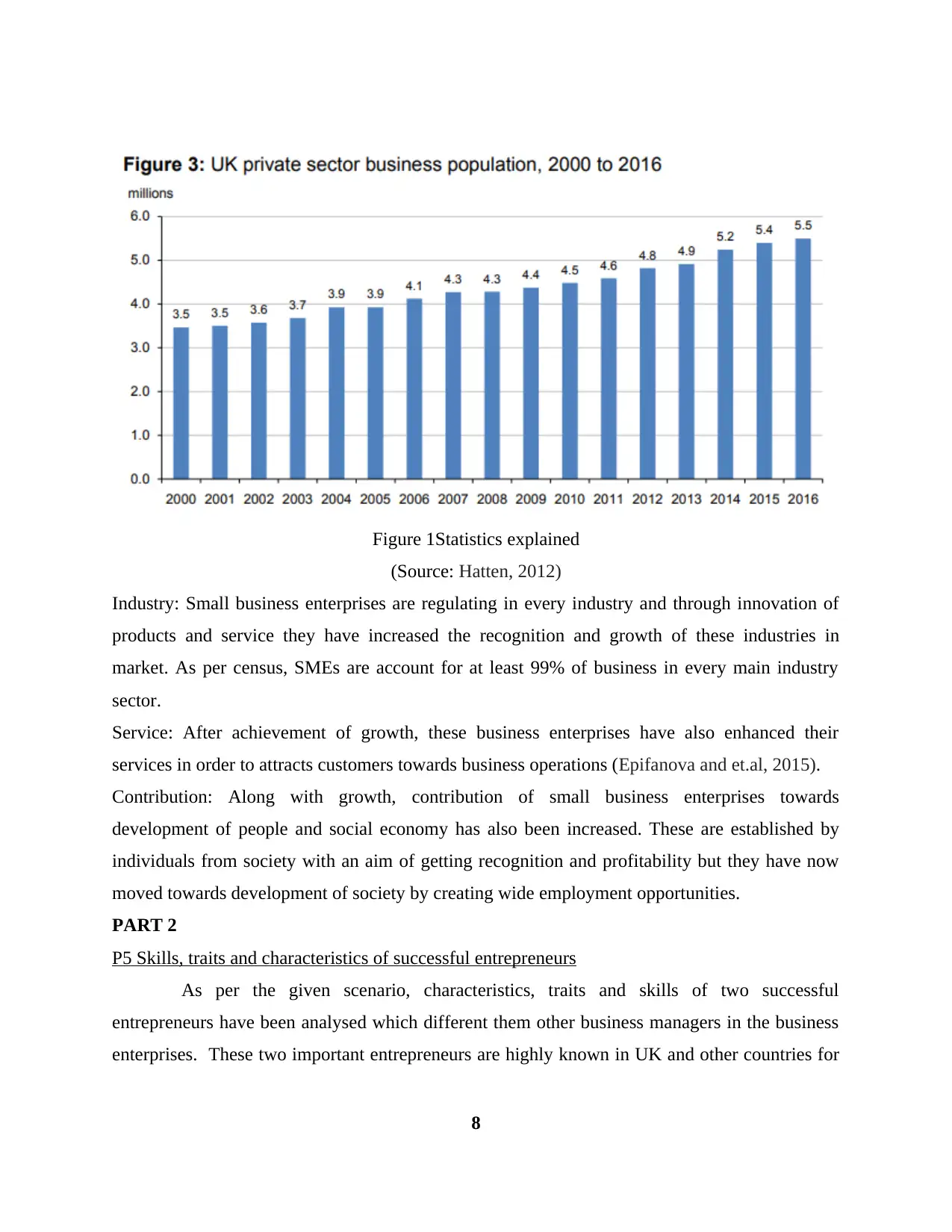
Figure 1Statistics explained
(Source: Hatten, 2012)
Industry: Small business enterprises are regulating in every industry and through innovation of
products and service they have increased the recognition and growth of these industries in
market. As per census, SMEs are account for at least 99% of business in every main industry
sector.
Service: After achievement of growth, these business enterprises have also enhanced their
services in order to attracts customers towards business operations (Epifanova and et.al, 2015).
Contribution: Along with growth, contribution of small business enterprises towards
development of people and social economy has also been increased. These are established by
individuals from society with an aim of getting recognition and profitability but they have now
moved towards development of society by creating wide employment opportunities.
PART 2
P5 Skills, traits and characteristics of successful entrepreneurs
As per the given scenario, characteristics, traits and skills of two successful
entrepreneurs have been analysed which different them other business managers in the business
enterprises. These two important entrepreneurs are highly known in UK and other countries for
8
(Source: Hatten, 2012)
Industry: Small business enterprises are regulating in every industry and through innovation of
products and service they have increased the recognition and growth of these industries in
market. As per census, SMEs are account for at least 99% of business in every main industry
sector.
Service: After achievement of growth, these business enterprises have also enhanced their
services in order to attracts customers towards business operations (Epifanova and et.al, 2015).
Contribution: Along with growth, contribution of small business enterprises towards
development of people and social economy has also been increased. These are established by
individuals from society with an aim of getting recognition and profitability but they have now
moved towards development of society by creating wide employment opportunities.
PART 2
P5 Skills, traits and characteristics of successful entrepreneurs
As per the given scenario, characteristics, traits and skills of two successful
entrepreneurs have been analysed which different them other business managers in the business
enterprises. These two important entrepreneurs are highly known in UK and other countries for
8
Paraphrase This Document
Need a fresh take? Get an instant paraphrase of this document with our AI Paraphraser
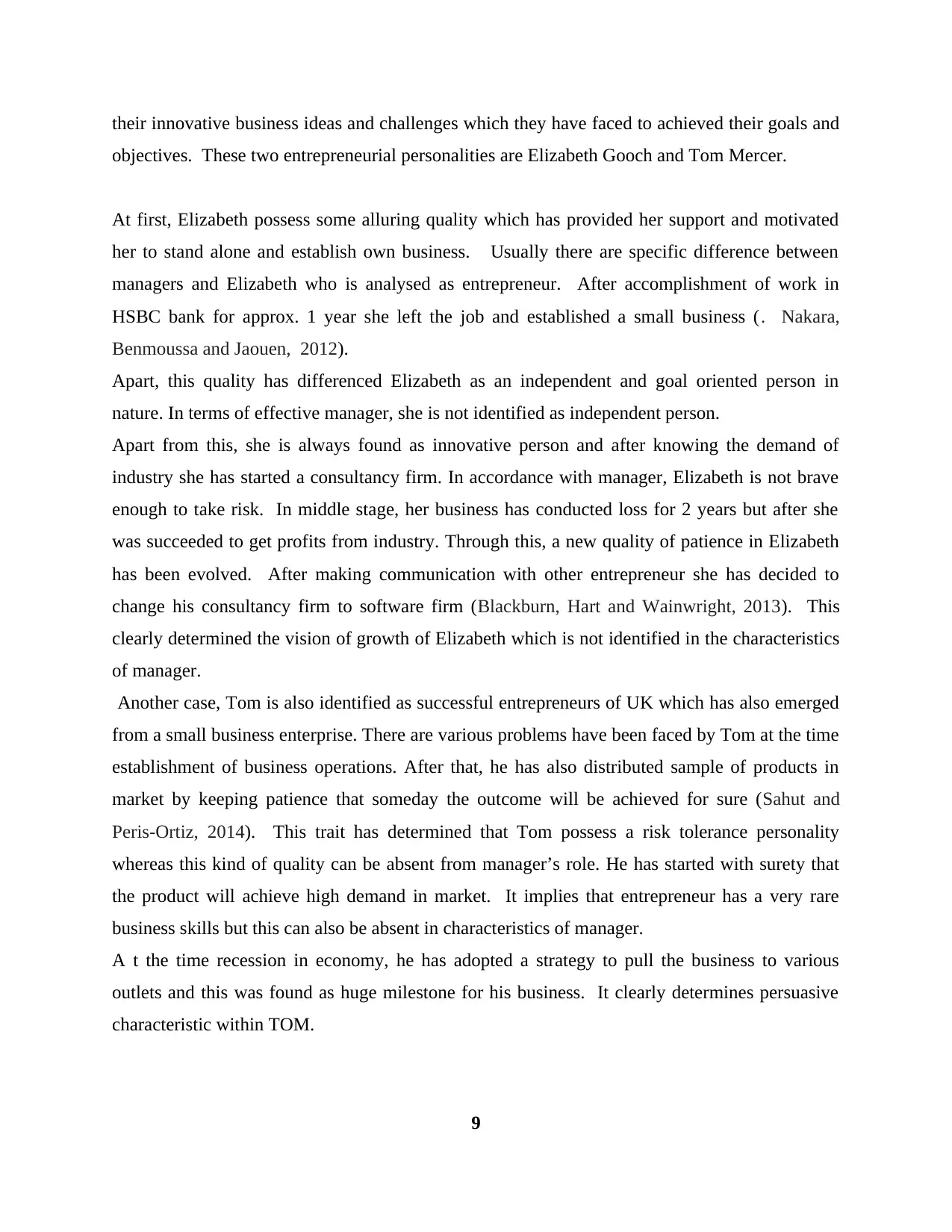
their innovative business ideas and challenges which they have faced to achieved their goals and
objectives. These two entrepreneurial personalities are Elizabeth Gooch and Tom Mercer.
At first, Elizabeth possess some alluring quality which has provided her support and motivated
her to stand alone and establish own business. Usually there are specific difference between
managers and Elizabeth who is analysed as entrepreneur. After accomplishment of work in
HSBC bank for approx. 1 year she left the job and established a small business (. Nakara,
Benmoussa and Jaouen, 2012).
Apart, this quality has differenced Elizabeth as an independent and goal oriented person in
nature. In terms of effective manager, she is not identified as independent person.
Apart from this, she is always found as innovative person and after knowing the demand of
industry she has started a consultancy firm. In accordance with manager, Elizabeth is not brave
enough to take risk. In middle stage, her business has conducted loss for 2 years but after she
was succeeded to get profits from industry. Through this, a new quality of patience in Elizabeth
has been evolved. After making communication with other entrepreneur she has decided to
change his consultancy firm to software firm (Blackburn, Hart and Wainwright, 2013). This
clearly determined the vision of growth of Elizabeth which is not identified in the characteristics
of manager.
Another case, Tom is also identified as successful entrepreneurs of UK which has also emerged
from a small business enterprise. There are various problems have been faced by Tom at the time
establishment of business operations. After that, he has also distributed sample of products in
market by keeping patience that someday the outcome will be achieved for sure (Sahut and
Peris-Ortiz, 2014). This trait has determined that Tom possess a risk tolerance personality
whereas this kind of quality can be absent from manager’s role. He has started with surety that
the product will achieve high demand in market. It implies that entrepreneur has a very rare
business skills but this can also be absent in characteristics of manager.
A t the time recession in economy, he has adopted a strategy to pull the business to various
outlets and this was found as huge milestone for his business. It clearly determines persuasive
characteristic within TOM.
9
objectives. These two entrepreneurial personalities are Elizabeth Gooch and Tom Mercer.
At first, Elizabeth possess some alluring quality which has provided her support and motivated
her to stand alone and establish own business. Usually there are specific difference between
managers and Elizabeth who is analysed as entrepreneur. After accomplishment of work in
HSBC bank for approx. 1 year she left the job and established a small business (. Nakara,
Benmoussa and Jaouen, 2012).
Apart, this quality has differenced Elizabeth as an independent and goal oriented person in
nature. In terms of effective manager, she is not identified as independent person.
Apart from this, she is always found as innovative person and after knowing the demand of
industry she has started a consultancy firm. In accordance with manager, Elizabeth is not brave
enough to take risk. In middle stage, her business has conducted loss for 2 years but after she
was succeeded to get profits from industry. Through this, a new quality of patience in Elizabeth
has been evolved. After making communication with other entrepreneur she has decided to
change his consultancy firm to software firm (Blackburn, Hart and Wainwright, 2013). This
clearly determined the vision of growth of Elizabeth which is not identified in the characteristics
of manager.
Another case, Tom is also identified as successful entrepreneurs of UK which has also emerged
from a small business enterprise. There are various problems have been faced by Tom at the time
establishment of business operations. After that, he has also distributed sample of products in
market by keeping patience that someday the outcome will be achieved for sure (Sahut and
Peris-Ortiz, 2014). This trait has determined that Tom possess a risk tolerance personality
whereas this kind of quality can be absent from manager’s role. He has started with surety that
the product will achieve high demand in market. It implies that entrepreneur has a very rare
business skills but this can also be absent in characteristics of manager.
A t the time recession in economy, he has adopted a strategy to pull the business to various
outlets and this was found as huge milestone for his business. It clearly determines persuasive
characteristic within TOM.
9
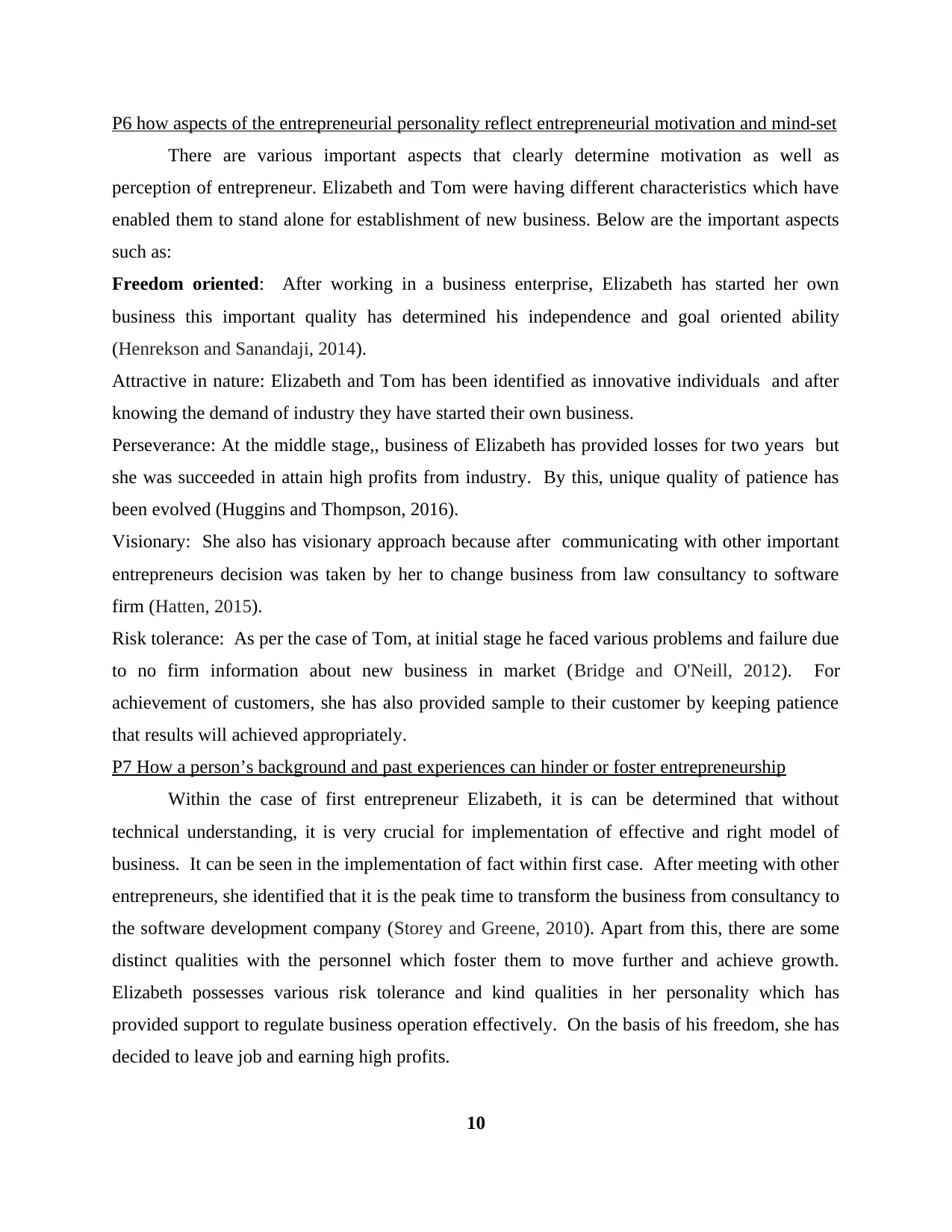
P6 how aspects of the entrepreneurial personality reflect entrepreneurial motivation and mind-set
There are various important aspects that clearly determine motivation as well as
perception of entrepreneur. Elizabeth and Tom were having different characteristics which have
enabled them to stand alone for establishment of new business. Below are the important aspects
such as:
Freedom oriented: After working in a business enterprise, Elizabeth has started her own
business this important quality has determined his independence and goal oriented ability
(Henrekson and Sanandaji, 2014).
Attractive in nature: Elizabeth and Tom has been identified as innovative individuals and after
knowing the demand of industry they have started their own business.
Perseverance: At the middle stage,, business of Elizabeth has provided losses for two years but
she was succeeded in attain high profits from industry. By this, unique quality of patience has
been evolved (Huggins and Thompson, 2016).
Visionary: She also has visionary approach because after communicating with other important
entrepreneurs decision was taken by her to change business from law consultancy to software
firm (Hatten, 2015).
Risk tolerance: As per the case of Tom, at initial stage he faced various problems and failure due
to no firm information about new business in market (Bridge and O'Neill, 2012). For
achievement of customers, she has also provided sample to their customer by keeping patience
that results will achieved appropriately.
P7 How a person’s background and past experiences can hinder or foster entrepreneurship
Within the case of first entrepreneur Elizabeth, it is can be determined that without
technical understanding, it is very crucial for implementation of effective and right model of
business. It can be seen in the implementation of fact within first case. After meeting with other
entrepreneurs, she identified that it is the peak time to transform the business from consultancy to
the software development company (Storey and Greene, 2010). Apart from this, there are some
distinct qualities with the personnel which foster them to move further and achieve growth.
Elizabeth possesses various risk tolerance and kind qualities in her personality which has
provided support to regulate business operation effectively. On the basis of his freedom, she has
decided to leave job and earning high profits.
10
There are various important aspects that clearly determine motivation as well as
perception of entrepreneur. Elizabeth and Tom were having different characteristics which have
enabled them to stand alone for establishment of new business. Below are the important aspects
such as:
Freedom oriented: After working in a business enterprise, Elizabeth has started her own
business this important quality has determined his independence and goal oriented ability
(Henrekson and Sanandaji, 2014).
Attractive in nature: Elizabeth and Tom has been identified as innovative individuals and after
knowing the demand of industry they have started their own business.
Perseverance: At the middle stage,, business of Elizabeth has provided losses for two years but
she was succeeded in attain high profits from industry. By this, unique quality of patience has
been evolved (Huggins and Thompson, 2016).
Visionary: She also has visionary approach because after communicating with other important
entrepreneurs decision was taken by her to change business from law consultancy to software
firm (Hatten, 2015).
Risk tolerance: As per the case of Tom, at initial stage he faced various problems and failure due
to no firm information about new business in market (Bridge and O'Neill, 2012). For
achievement of customers, she has also provided sample to their customer by keeping patience
that results will achieved appropriately.
P7 How a person’s background and past experiences can hinder or foster entrepreneurship
Within the case of first entrepreneur Elizabeth, it is can be determined that without
technical understanding, it is very crucial for implementation of effective and right model of
business. It can be seen in the implementation of fact within first case. After meeting with other
entrepreneurs, she identified that it is the peak time to transform the business from consultancy to
the software development company (Storey and Greene, 2010). Apart from this, there are some
distinct qualities with the personnel which foster them to move further and achieve growth.
Elizabeth possesses various risk tolerance and kind qualities in her personality which has
provided support to regulate business operation effectively. On the basis of his freedom, she has
decided to leave job and earning high profits.
10
⊘ This is a preview!⊘
Do you want full access?
Subscribe today to unlock all pages.

Trusted by 1+ million students worldwide
1 out of 15
Related Documents
Your All-in-One AI-Powered Toolkit for Academic Success.
+13062052269
info@desklib.com
Available 24*7 on WhatsApp / Email
![[object Object]](/_next/static/media/star-bottom.7253800d.svg)
Unlock your academic potential
Copyright © 2020–2026 A2Z Services. All Rights Reserved. Developed and managed by ZUCOL.





